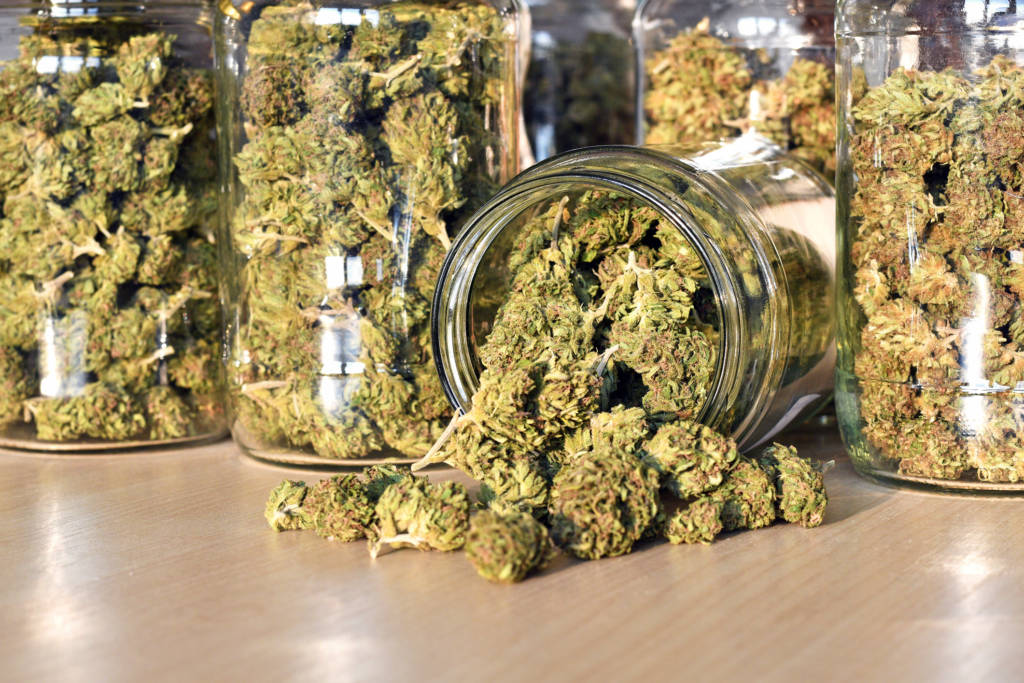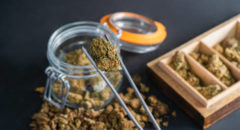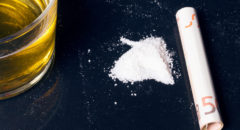
Canadians are rejoicing this week as laws have passed legalizing marijuana to ALL of Canada. Yes, now in the entire country, weed is legal.
In Canada as of Fall 2018, adults are now allowed to buy, use, possess and grow recreational marijuana, under the law. In Quebec and Alberta, the legal age is 18; it's 19 in the remainder of the country. The measure legalizing the recreational use of the drug passed the Senate in June and now it's officially become law.
Back here in the states, owners of the commercial establishments selling marijuana across the nation, after starting in Colorado, say that they've already generated a combined total of roughly $5.4 Billion in sales since it became legal for adults to purchase and use marijuana for recreational reasons. The main reason shoppers give for buying it: "medical reasons."
Also, recently, in a unanimous decision, the Atlanta City Council voted to sanction possession of small amounts of the herbal drug, allowing those caught in possession of less than an ounce the opportunity to avoid jail time and pay a maximum fine of $75. The current penalty for possession is up to six months in jail and a fine of up to $1,000. While the herbs medicinal use is not yet legal in the city, many say this is a huge step in the right direction to one day make it legal.
READ: Marijuana & Testicular Cancer: Is There A Connection
Here are the states where it is legal:

But what really is medical marijuana?
History
The marijuana plant is made up of more than 500 chemical compounds. Many of these compounds are cannabinoids, which bind to receptors in your body and then affect your immune system and brain. Researchers have pinpointed two main cannabinoids: THC and cannabidiol, or CBD—as beneficial to the human body. The biggest difference: CBD doesn’t make you high, but THC does.
Trouble is, when exposed to the high temperature (like that of a burning joint), the 500 or so chemical compounds in marijuana can produce hundreds or thousands of byproducts—many of which are thought to be carcinogens. Research suggests that marijuana smoke can contain up to 70 percent more carcinogenic materials than tobacco smoke. While many researchers think that—logically—marijuana smoke should cause lung cancer, studies remain inconclusive.
In 1970, the government classified marijuana as a Schedule I drug—alongside heroin and LSD—as a substance with high abuse potential and no accepted medical purpose. But in 1967, medical doctor and researcher, Dr. Lester Grinspoon’s teenage son was diagnosed with acute lymphocytic leukemia. Chemotherapy left him with no appetite, vomiting spells, and nausea—“the kind you feel right down to your toenails,” the doctor remembers. The drugs that were supposed to ease the pain didn’t. So Dr. Grinspoon’s wife pulled up to Wellesley High School and asked her son’s friend for weed.
A few minutes before his treatments, Dr. Grinspoon’s son would take a few puffs.
“We never—for as long as he lived—had to deal with that awful experience of seeing what he went through again,” he says.
This is one reason why the FDA approved Marinol—a low-dosage formulation of synthetic THC that comes in capsule form. The drug is used to stimulate appetite in HIV-positive patients and control the nausea and vomiting that’s associated with chemotherapy. Many believe that it's a good option for people with conditions like cancer who don’t respond to commonly prescribed drugs. It's been medically proven to lower intraocular pressure for glaucoma patients, reduce anxiety, and stimulate patient's appetite.
There is growing interest in the marijuana chemical cannabidiol (CBD) to treat certain conditions such as childhood epilepsy, a disorder that causes a child to have violent seizures. Therefore, scientists have been especially breeding marijuana plants and making CBD in oil form for treatment purposes. These drugs aren't popular for recreational use because they aren't intoxicating.
But there's a problem: Marinol is one of only two FDA-approved THC-based drugs. Also, your body doesn’t absorb it as well as many over-the-counter drugs. Only about 10 to 20 percent of the dose becomes available for your body to use. That makes it unpredictable: For some, the drug works great, while others see no benefit.
True medical marijuana is used for a variety of ailments and conditions, including:
- Easing nausea and vomiting.
- Stimulating appetite in chemotherapy and/or AIDS patients.
- Reducing eye pressure in glaucoma patients
- Managing chronic pain.
- Treating gastrointestinal illnesses.
Recent research has also suggested that some of the compounds in marijuana may have beneficial qualities for patients suffering from a variety of other conditions, such as multiple sclerosis (MS), Alzheimer's disease, breast cancer, brain cancer, Lou Gehrig's Disease, insomnia, and even asthma.
Medicinal compounds in marijuana
Cannabis contains almost 500 compounds, of which about 80 are used for medicine and science. Five of these compounds are used frequently in medicine:
- Tetrahydrocannabinol (THC) is the chemical in marijuana that produces its psychoactive effects. This chemical has been proven to also be a mild pain reliever and sleep inducer, as well as an antioxidant.
- Cannabidiol (CBD) is one of the primary compounds extracted for medical marijuana. CBD has been provent to relieve convulsion, inflammation, anxiety, cough, congestion, and nausea, and it inhibits cancer cell growth.
- Cannabinol (CBN) is thought to inhibit the spread of cancer cells.
- β-caryophyllene is used to reduce inflammation.
- Cannabigerol relieves intraocular pressure of the eye, so it's used in the treatment of glaucoma.
Side Effects
Researchers believe that regular cannabis use can have neurotoxic effects on maturing brain structures. A 2012 study found that people who started smoking before age 18 showed a greater decline in IQ and cognitive functioning than people who started as adults. Also, heavy teen users—an average of four or more times a week—who continued to smoke as adults experienced an 8-point IQ drop which could not be blamed on alcohol, other drugs, or less education.
READ: Teen Drug Abuse: The 6 Warning Signs
THC has what doctors and researchers know as "biphasic activity." At low doses it has certain effects, and at high doses it can have opposite effects. In fact, somebody using it to get high with the right dose will be calm, have an appetite, see medical benefits, etc. But, take in too much THC, and a person can become irritable, even psychotic.
In 1937, the federal government passed the Marijuana Tax Act to prevent its recreational use. In the past 10 years, enforcing pot laws has cost taxpayers more than $211 million in the state of Washington alone, according to recent research by the American Civil Liberties Union of Washington State.








